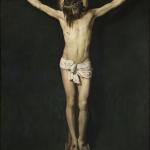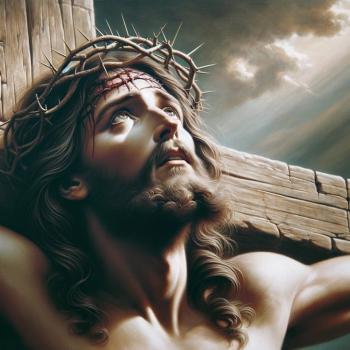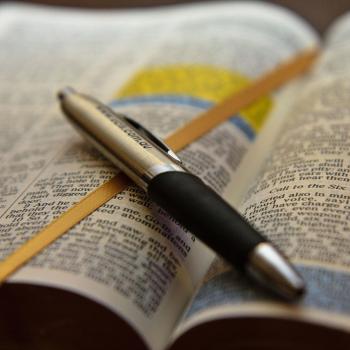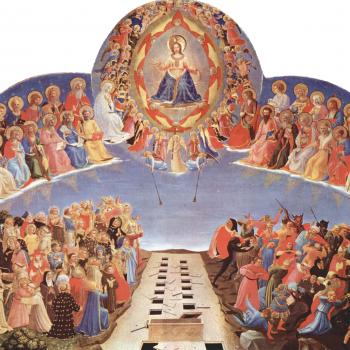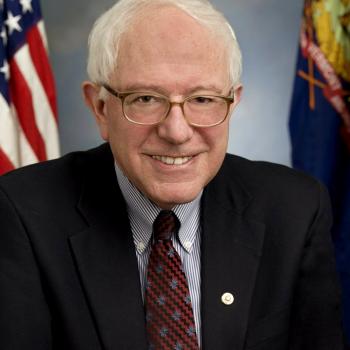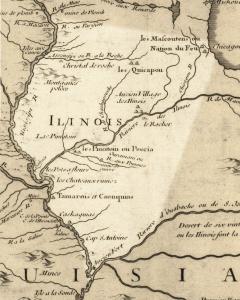Sometimes your humble servant says that politics is the religion of Satan. That’s hyperbole, of course. But hyperbole, properly administered, should jar the hearer or reader to an underlying sober reality.
Our Lord is the greatest hyperbolist of all, telling us such things as: “If your right eye causes you to sin, tear it out and throw it away. It is better for you to lose one of your members than to have your whole body thrown into Gehenna. And if your right hand causes you to sin, cut it off and throw it away. It is better for you to lose one of your members than to have your whole body go into Gehenna.” (Matthew 5:29-30)
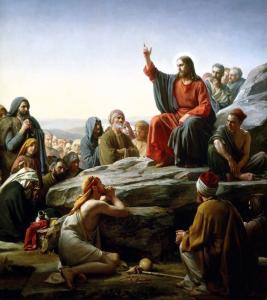
Carl Bloch, 1890
What this means, of course, is that nothing, even the things that we hold most dear, should stand in the way of obtaining salvation. But Jesus’s way of putting it drives the point home with far more impact than the mere recitation of that truth.
Of course, my poor offering pales in comparison with our Lord’s pithy wit. And for that reason it might not be entirely clear what I’m trying to convey by it. That means I have to explain it, and this I will now endeavor to do.
What I mean when I say that politics is the religion of Satan is that it causes people to behave badly. At the top of the list is war, of course. People often accuse religion of causing wars, but we have seen how when politics and religion are separated, religion becomes rather non-threatening whereas politics continues with the bloodshed apace. The United States can’t seem to stop fighting wars, although it has a Constitutional provision keeping religion out of its government. Meanwhile, the Methodists and Unitarians manage to stay fairly non-threatening. It turns out that religion is violent only when it is co-opted by politics, and it is politics that is the actual culprit.
Now the reason why politics makes people behave badly is that politics is, at bottom, about allocation of resources. That’s why interest groups try to funnel money to politicians, so that politicians will reward such efforts with legislation that will assist those interest groups in gaining control of resources. And gaining control of resources is approached as a zero-sum game. Some interests succeed in getting control of resources, and others get screwed. Those who succeed in getting control of resources are call the “rich.” Those who get screwed are called the “poor.” The rich are able to redirect the resources they have gained back to the politicians, who reward them with yet more resources. The poor have no resources to donate, and thus continue to get screwed.
Enter the Catholic Church.
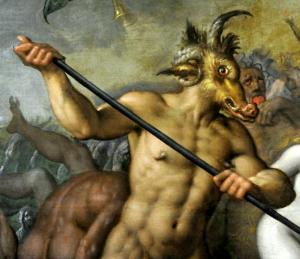 The Church is not, contrary to the fond wishes of some, supposed to stay out of politics. On the contrary, the Church’s mission in politics is to provide as much weight as is possible on the side of the poor, without losing sight of the fact that the rich are also created in the image of God. The position of the Church is basically this: Stop screwing people, whether they be unborn infants, working people, the impoverished, children, women, racial minorities, or immigrants; treat others as you would like to be treated; treat every human being as an end in himself or herself, even those who don’t conform to Catholic morality.
The Church is not, contrary to the fond wishes of some, supposed to stay out of politics. On the contrary, the Church’s mission in politics is to provide as much weight as is possible on the side of the poor, without losing sight of the fact that the rich are also created in the image of God. The position of the Church is basically this: Stop screwing people, whether they be unborn infants, working people, the impoverished, children, women, racial minorities, or immigrants; treat others as you would like to be treated; treat every human being as an end in himself or herself, even those who don’t conform to Catholic morality.
Politics can’t imagine such a thing. With politics, somebody has to get screwed; and that is why, with politics, somebody has always gotten screwed. It’s not surprising, therefore, that political argumentation tends to be so vituperative and irrational. People are arguing over who is going to control resources, and who is going to get screwed.
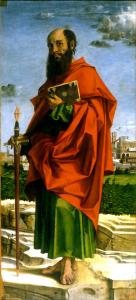 Catholics are, or ought to be, out of place in discussions of this kind. Our proper posture toward it all is to try to slay the monster insisting that someone get screwed. Unfortunately, we too often get swallowed by the monster instead. The result is that the world gets treated to the spectacle of Catholics arguing over whose political party is more Catholic, with the side effect of us minimizing the decidedly un-Catholic positions of our parties. And these arguments contain no less venom than those involving people who come from a purely secular perspective.
Catholics are, or ought to be, out of place in discussions of this kind. Our proper posture toward it all is to try to slay the monster insisting that someone get screwed. Unfortunately, we too often get swallowed by the monster instead. The result is that the world gets treated to the spectacle of Catholics arguing over whose political party is more Catholic, with the side effect of us minimizing the decidedly un-Catholic positions of our parties. And these arguments contain no less venom than those involving people who come from a purely secular perspective.
That interferes with evangelization, of course. Someone witnessing exchanges of this kind are justified in saying, “Who wants to belong to a religion like that?” And, yes, we should be concerned about that. It is of paramount importance.
But there’s no ambiguity about what we should be doing. We are supposed to be the “salt of the earth,” the “light of the world.” What that means in this context is that we should be trying to transform the parties wherein we find ourselves into parties that seek the good of all, instead of letting the parties transform us. Democrat or Republican, we should all be seeking an end to the harm done to flesh and blood human beings by politics. We should be working to abolish the notion of acceptable casualties. And in discussing these issues with each other we should be following the admonition of St. Paul:
“Do not grieve the Holy Spirit of God, with which you were sealed for the day of redemption. All bitterness, fury, anger, shouting, and reviling must be removed from you, along with all malice. And be kind to one another, compassionate, forgiving one another as God has forgiven you in Christ.
“So be imitators of God, as beloved children, and live in love, as Christ loved us and handed himself over for us as a sacrificial offering to God for a fragrant aroma.” (Ephesians 4:30-5:2)
Nothing more need be said on that point.
Excerpts from the Lectionary for Mass for Use in the Dioceses of the United States of America, second typical edition © 2001, 1998, 1997, 1986, 1970 Confraternity of Christian Doctrine, Inc., Washington, DC. Used with permission. All rights reserved. No portion of this text may be reproduced by any means without permission in writing from the copyright owner.
The icon of St. Joseph the Worker is by Daniel Nichols.
Listen to Christian Democracy on live internet radio on Tuesdays at 10:30 p.m. Eastern time at WCAT Radio here, or listen to the podcast here on the Christian Democracy Patheos blog.
Please go like Christian Democracy on Facebook here. Join the discussion on Catholic social teaching here.


